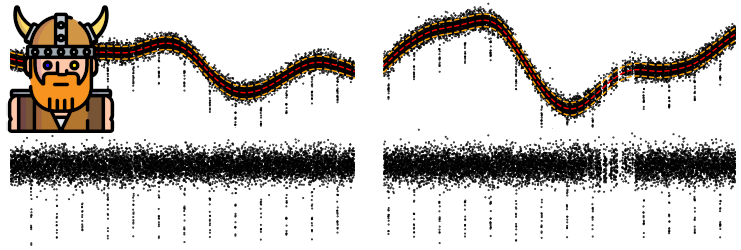Detrending algorithms
Project description
Wōtan...
...offers free and open source algorithms to automagically remove trends from time-series data.
In Germanic mythology, Odin (/ˈoːðinː/ Old High German: Wōtan) is a widely revered god. He gave one of his eyes to Mimir in return for wisdom. Thus, in order to achieve a goal, one sometimes has to turn a blind eye. In Richard Wagner's "Der Ring des Nibelungen", Wotan is the King of the Gods (god of light, air, and wind) and a bass-baritone. According to Wagner, he is the "pinnacle of intelligence".
Example usage
from wotan import flatten
flatten_lc, trend_lc = flatten(time, flux, window_length=0.5, method='biweight', return_trend=True)
For more details, have a look at the interactive playground, the documentation and tutorials.
Available detrending algorithms
- Time-windowed sliders with location estimates:
biweightRobust M-estimator using Tukey's biweighthuberRobust M-estimator from Huber (1981) (iterative)huber_psiRobust M-estimator based on Huber's ψ (one-step)hampelRobust M-estimator based on Hampel (1972), 3-part descending, known as (a,b,c), 17A, 25AandrewsinewaveRobust M-estimator using Andrew's sine wavewelschRobust M-estimator from Welsch-LeclercramsayRobust M-estimator from Ramsay (1977), known as Ramsay's EatauRobust τ estimator from Yohai & Zamar (1986)hodgesRank-based robust R-estimator Hodges-Lehmann-SenmedianThe most robust (but least efficient)medfiltA cadence-based median filter (not time-windowed) for comparisonmeanThe least robust (but most efficient for white noise)trim_meanTrimmed mean (outliers are removed)winsorizeTrimmed mean (outliers are winsorized to a specified percentile)hampelfiltTrimmed mean (outliers are replaced with the median)
- Splines:
rsplineSpline with iterative sigma-clippinghsplineSpline with a robust Huber estimator (Huber 1981)psplinePenalized spline to automatically select the knot distance (Eilers 1996), with iterative sigma-clipping
- Polynomials and others:
lowessLocally weighted scatterplot smoothing (Cleveland 1979)cofiamCosine Filtering with Autocorrelation Minimization (Kipping et al. 2013)cosineSum of sines and cosines, with option for iterative sigma-clippingsavgolSliding segments are fit with polynomials (Savitzky & Golay 1964), cadence-basedsupersmootherFriedman's (1984) Super-Smoother, a local linear regression with adaptive bandwidth
gpGaussian Processes offering:squared_expSquared-exponential kernel, with option for iterative sigma-clippingmaternMatern 3/2 kernel, with option for iterative sigma-clippingperiodicPeriodic kernel informed by a user-specified periodperiodic_autoPeriodic kernel informed by a Lomb-Scargle periodogram pre-search
Available features
window_lengthThe length of the filter window in units oftime(usually days).break_toleranceIf there are large gaps in time, especially with corresponding flux level offsets, the detrending is much improved when splitting the data into several sub-lightcurves and applying the filter to each individually. Comes with an empirical default and is fully adjustable.edge_cutoffTrends near edges are less robust. Depending on the data, it may be beneficial to remove edges.cvalTuning parameter for the robust estimators (see documentation)return_trendIfTrue, the method will return a tuple of two elements (flattened_flux,trend_flux) wheretrend_fluxis the removed trend. Otherwise, it will only returnflattened_flux.
What method to choose?
It depends on your data and what you like to achieve (relevant xkcd). If possible, try it out! Use wotan with a selection of methods, iterate over their parameter space, and choose what gives the best results for your research.
If that is too much effort, you should first examine your data.
- Is it mostly white (Gaussian) noise? Use a time-windowed sliding mean. This is the most efficient method for white noise.
- With prominent outliers (such as transits or flares), use a robust time-windowed method such as the
biweight. This is usually superior to themedianor trimmed methods. - Are there (semi-) periodic trends? In addition to a time-windowed biweight, try a spline-based method. Experimenting with periodic GPs is worthwhile.
Installation
To install the released version, type
$ pip install wotan
which automatically installs numpy, numba and scipy if not present. Depending on the algorithm, additional dependencies exist:
lowessandhuberdepend onstatsmodelshsplineandgpdepend onsklearnpsplinedepends onpygamsupersmootherdepends onsupersmoother
To install all additional dependencies, type $ pip install statsmodels sklearn supersmoother pygam.
Originality
As all scientific work, wōtan is standing on the shoulders of giants. Particularly, many detrending methods are wrapped from existing packages. Original contributions include:
- A time-windowed detrending master module with edge treatments and segmentation options
- Robust location estimates using Newton-Raphson iteration to a precision threshold for Tukey's biweight, Andrew's sine wave, and the Welsch-Leclerc. This is probably a "first", which reduces jitter in the location estimate by ~10 ppm
- Robustified (iterative sigma-clipping) penalized splines for automatic knot distance determination and outlier resistance
- Robustified (iterative sigma-clipping) Gaussian processes
- GP with a periodic kernel informed by a Lomb-Scargle periodogram pre-search
- Bringing together many methods in one place in a common interface, with sensible defaults
- Providing documentation, tutorials, and a paper which compares and benchmarks the methods
Attribution
Please cite Hippke et al. (2019) if you find this code useful in your research. The BibTeX entry for the paper is:
@ARTICLE{2019arXiv190600966H,
author = {{Hippke}, Michael and {David}, Trevor J. and {Mulders}, Gijs D. and
{Heller}, Ren{\'e}},
title = "{Wotan: Comprehensive time-series de-trending in Python}",
journal = {arXiv e-prints},
keywords = {Astrophysics - Earth and Planetary Astrophysics, Astrophysics - Instrumentation and Methods for Astrophysics},
year = "2019",
month = "Jun",
eid = {arXiv:1906.00966},
pages = {arXiv:1906.00966},
archivePrefix = {arXiv},
eprint = {1906.00966},
primaryClass = {astro-ph.EP},
adsurl = {https://ui.adsabs.harvard.edu/abs/2019arXiv190600966H},
adsnote = {Provided by the SAO/NASA Astrophysics Data System}
}
Project details
Release history Release notifications | RSS feed
Download files
Download the file for your platform. If you're not sure which to choose, learn more about installing packages.
Source Distribution
Built Distribution
File details
Details for the file wotan-1.0.5.tar.gz.
File metadata
- Download URL: wotan-1.0.5.tar.gz
- Upload date:
- Size: 23.2 kB
- Tags: Source
- Uploaded using Trusted Publishing? No
- Uploaded via: twine/1.12.1 pkginfo/1.4.2 requests/2.19.1 setuptools/40.6.3 requests-toolbelt/0.8.0 tqdm/4.31.1 CPython/3.7.2
File hashes
| Algorithm | Hash digest | |
|---|---|---|
| SHA256 | 6482d1669a864d76ff2b5c21ca4d05f688dc81b04e11f563a3fb644168787d42 |
|
| MD5 | f33e67acbb6a26b4e404accd62e5b52b |
|
| BLAKE2b-256 | cec143833b370c6da7d66c79515f6dfb8321dbd6bb664570f1cdbfad1011935e |
File details
Details for the file wotan-1.0.5-py3-none-any.whl.
File metadata
- Download URL: wotan-1.0.5-py3-none-any.whl
- Upload date:
- Size: 25.5 kB
- Tags: Python 3
- Uploaded using Trusted Publishing? No
- Uploaded via: twine/1.12.1 pkginfo/1.4.2 requests/2.19.1 setuptools/40.6.3 requests-toolbelt/0.8.0 tqdm/4.31.1 CPython/3.7.2
File hashes
| Algorithm | Hash digest | |
|---|---|---|
| SHA256 | 96ad38bfbe6fb6378649692272d96ebbf303695a77cb41275fea2b1af0f45b71 |
|
| MD5 | 3bacc02044d8c4a4170630b73865eaef |
|
| BLAKE2b-256 | 79ae3b8d40908fce49a934b2a2a551ed161efc5c5ac836db1969450d6ded7913 |

















